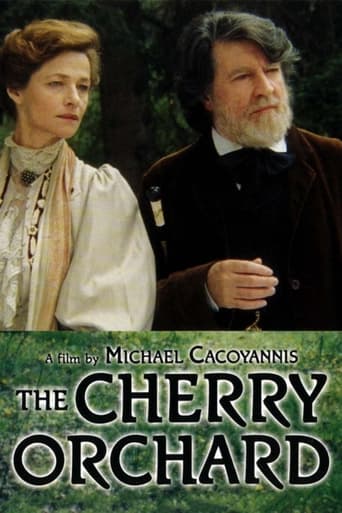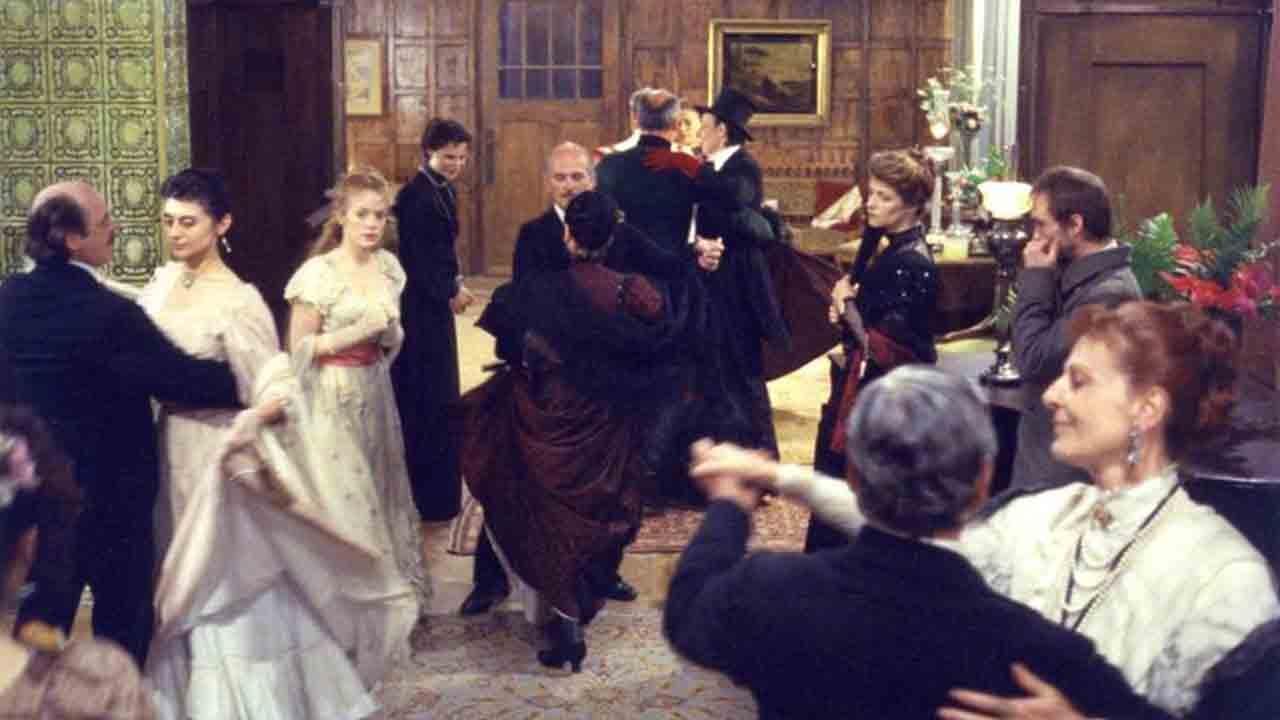Benjamin Fogg
Obligatory disclaimer: I am not familiar with the traditions of the Russian stage. Whether this is the realization of Anton Chekhov's dream for his production or a terrible mockery of it, I have no idea.Regardless of how it relates to the original format, however, it's clear that it stays a little truer to its roots than would be beneficial. The acting tends towards the stilted more often than not, and while the characters are allowed their respective personalities, they remain just that: characters. This could certainly be spun as subtle commentary on the restrictive social roles in Russia at the turn of the 20th century, but at that point, the only thing you'll be grabbing is straws.What is relevant is the contemporary social commentary. Chekhov's play premiered a mere thirteen years before the Russian Revolution, when Russia's recently-formed capitalist class was making itself the nuisance that the Bolsheviks needed for their uprising. Represented in the film by the character of Lopahkin, his relationship with Madame Renevskaya echoes the growing power of the self-made wealthy over the gentry. The advice of the capitalist goes unheeded time and time again as sentimentality overrides rational decisions regarding the Renevskaya estate. The estate, symbolized by the cherry orchard, is the last remaining tie to the glory of nobility in Russia prior to emancipation in 1861.While he's presented as the opposition to most of the primary characters, it's difficult to present Lopahkin as a villain. His actions are rational. He operates under no pretenses whatsoever. In fact, while this may be something lost in translation from play to film or simply to the march of time, it's difficult to sympathize in the least with the Revenskayas. Their departure from the manor is depicted as bitter and forlorn, but they had it coming the whole time. Attachment impedes progress, resulting in their downfall and disgrace as members of the nobility.Thus, The Cherry Orchard is not a film meant to be watched on its own merit. A passing knowledge of Russian history in the 19th century is all but required to understand its message: possession of an estate means nothing when that estate brings in no money, for now, the forces of capitalism have overridden all but the oldest traditions in Russia. Even a lowly peasant can become the lord of an estate if they only have the material wealth for it.
dlloyd505
In his adaption of Anton Chekhov's play, The Cherry Orchard, Mihalis Kakogiannis shows a great deal of respect for the 19th century Russian play. In fact, Mihalis shows so much respect for it that he tried to have the film flow and seem very much like a play. Although the technique is an interesting way of trying to adapt a play to film, it ultimately leaves the audience wishing for less of a boisterous staged feel and more of a subtle real life feeling that film can so wonderfully produce. To Mihalis' misfortune the over animated and often over dramatized characters do more to take the audience out of the film than it does to push them into the story. Although the staged feel to The Cherry Orchard does make the film seem to drag on without the interest one would find in a lifelike representation of the events, there is several very significant themes that are important to Russian history that come across very nicely in the film.One of the most interesting aspects of The Cherry Orchard is the way that we see the very different reactions to the emancipation of the serfs. If we look at the two "main" characters of the film, Madame Ranevskaya and Gayev, we see two people that are having a very hard time adjusting to the realities of the serfs being freed. They're not only in constant denial of the economic state of their estate but they are also oblivious to the possibility that former serfs are gaining both power and respect. If we look at how the film expresses the Raznichintzhe class, we see two different expressions. First we see Lopakhin that represents the emerging merchant class in Russian. Although Lopakhin was a former slave, by the end of the film we see that he wields the most respect and power through the active and hard work that he has done as a free citizen. Now on the other hand, Trofimov represents the Intelligentsia class that is emerging towards the later part of the 19th century. His nickname as the perpetual student gives away that he is not about working and doing business in a capitalist society, instead he talks of enacting greater change to help the uneducated freed serf class that now has a ton of freedom and not a whole lot to do with it. Now as Lopakhin showed one of the possibilities for freed serfs Firs showed another. Firs represents a relic of the past, a serf that was more content with being a serf and serving than being forgotten and left behind in the new society. Which is exactly what happens to firs at the end of the movie. Just like Firs, older serfs that could not enjoy the full expanse of their newfound freedom were in a way left behind by society. Although as a movie I believe that The Cherry Orchard could have been a little more intriguing had the director strayed further way from the play format, there are still many interesting aspects to the film that make it a enjoyable piece of Russian oriented cinema. Definitely, worth the watch if you have any interest in Russian life towards the end of the 19th century.
colinxanderii
I did not enjoy this film, I enjoyed the story, but this particular telling of the story was not enjoyable for me. The story itself is based off of and named after the play The Cherry Orchard written by Anton Chekhov. The story is centered on a Russian noble family trying to hold onto an estate. Actually they don't actually try to hold onto the estate they just party and worry about losing the estate until they do. My reasons for not enjoying this film are not because the lack of action, I in fact enjoyed the narrative, but the way it was portrayed in the film was very unengaging. Which is odd since you would think that a film being shot around the idea of being both a theatrical play and a movie would be more stimulating, and perhaps it could be, but this film did not achieve this. In its attempt to be a theatrical play and a movie it loses elements of both. The audience performer dynamic for example you lose that sense of the audience watching you as you act is gone as well as the feeling of seeing the actors sweat while they do it all in one take. A film can't do this and it's not expected to. A theatrical play also has to rely on the fact that you can't fix things in post-production. However I do not dislike the film because of these elements.I dislike the film because of the terrible pacing, and the wooden acting, among other things. The first act of the film does not set up the characters or really even tell you who they are or what their names are. Although I wouldn't be surprised if they do in fact mention all the names and who they are in relation to each other, but with all the chaos, and the muttering, I'm not sure how I could figure it out without a guidebook. And while a film does not have to tell me all of the characters names, plays usually do, at least the ones I have gone to give you a little pamphlet telling you about who the actors are and who they play. The middle section of this film feels slow and painful so there is little build up for the delivery at the final parts of the film. This might be somewhat due to the narrative of the film but the acting exacerbates these negative elements and doesn't really let the stories good points shine through. Because of the mindset this film was directed in the actors act and talk spontaneously throughout the film, but apparently the attempt to give it feeling and impact was forgotten which makes the sudden spontaneous over acting feel wooden slow and really takes me out of the film. Most, if not all, of this film's good points are towards the end and it was absolutely not worth the wait (although the films ending need some serious work as the effectiveness it had was lost). If this review is very disjointed take that sense and try to multiply it by 11 that should be about how the acting feels like. The real cruel irony of this film is that it tries to be a film and a theatrical play and fails at being both. I do not recommend this film but I do recommend going out and seeing it done in a theatrical play.
katswaycool
Overall, I thought this film was a good representation of how a family and others were affected by a major historical event.The fact that this movie was originally written as a play changed how a viewed the movie. I feel like I most likely would've enjoyed it more seeing the play version, but the movie wasn't terrible. There were points were you could tell (such as the characters facial expressions, or their stage direction) that the movie followed closely to how the play would have been performed.A lot of the main ideas circled around the emancipation of the serfs in 1861, and how it affected the lives of both the serfs and the people who once owned the serfs. After the Ranyevskaya's Orchard was bought by Lopahin it sent a large statement out about the fact that man who was once a serf, was able to purchase the land he would have worked on if he weren't emancipated. On the other hand, we have Feers, who was also an emancipated serf, but there was a real struggle he was going through. He was old, didn't really have anywhere else to go, and cared about the family. When he is left alone at the end, we get a sense that while the emancipation was great for Russia, not everyone was able to feel it's glory. I gave it a 7/10 because it did have it's good moments, but I haven't seen the play so I feel like if I had, I would be more appreciative of it. I did like the connections to history, and thought it was an interesting story.


 AD
AD


